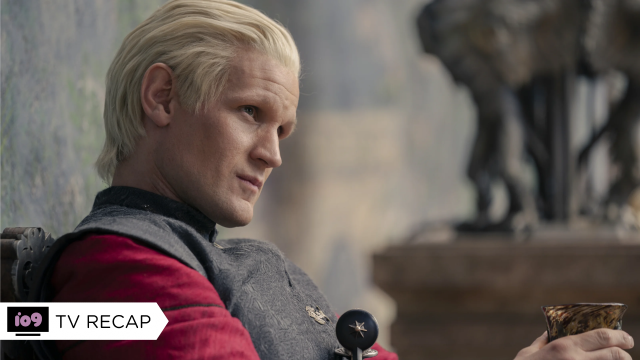When House of the Dragon premiered, I said that it was a show that was unsure whether it wanted to live in or out of Game of Thrones’ shadow. Four weeks later, I feel Dragon is already striding away, confident in where it wants to go — and where it wants to go is a different type of game of thrones.

In Game of Thrones, the titular game was primarily played with violence. Wars were waged. Kings were poisoned. Lords were beheaded. Few of the marriages were made for political power; you could argue that Sansa’s marriages to Joffrey and Ramsey Bolton were, but honestly, they both seemed more about punishing the Starks through Sansa than gaining any advantage. Danaerys’ marriages to Khal Drogo and Hizdahr zo Loraq were to make political alliances, but one of those Dany chose herself.
House of the Dragon is determined to show how the game of thrones is played with marriages, and how the women are merely pawns of the powerful men in charge. Their lack of agency is highlighted almost everywhere in “King of the Narrow Sea,” which I find an apt title — the episode is focused primarily on Rhaenyra (Milly Alcock) and Alicent (Emily Carey), but it’s still named after a man.
The episode begins with Rhaenyra at Dragonstone, hearing another long line of suitors making their plea to wed her. There’s a pompous old man, a scrawny 13-year-old, and a real arsehole who makes fun of the teen, only to get murdered when the kid pulls out his sword to defend his honour. Rhaenyra is fed up and returns to King’s Landing. On the way, her ship is rocked by Daemon (Matt Smith) atop his dragon Ceraxes, an unnecessary assault to let her know he’s come back.
In fact, Daemon’s come back with a crown of driftwood on his head and the Crabfeeder’s hammer in his hand (and short hair!), essentially spoils of war after absolutely bodying those pirates in last week’s episode. It’s a huge affront to his brother and king, Viserys (Paddy Considine), but it’s also just Daemon making a scene — he soon takes off the crown and kneels, pledging his loyalty. Viserys, always wanting to believe Daemon has changed for the better, welcomes him with open arms, and throws a party to celebrate Daemon’s defeat of the pirates.
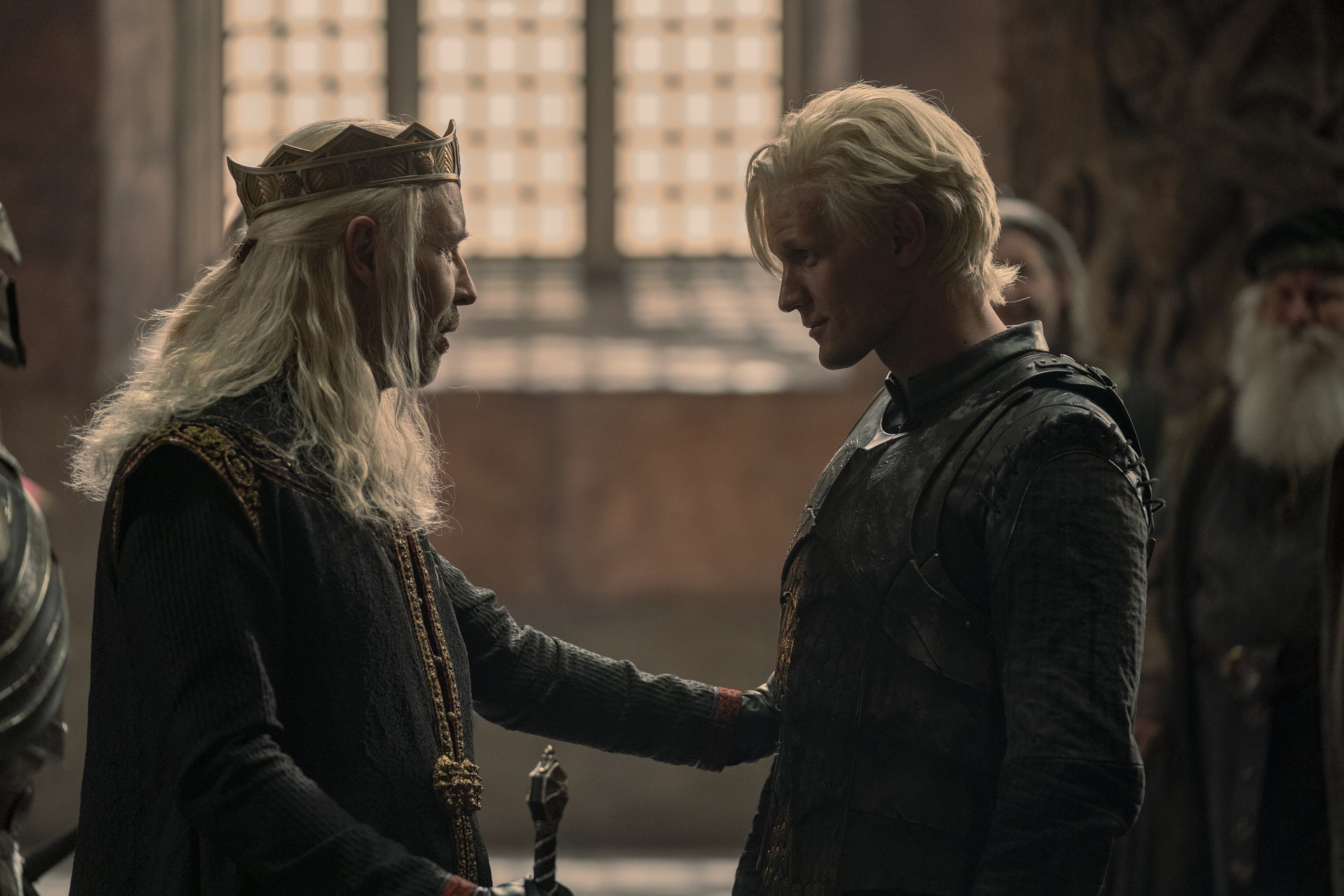
At the celebration, Rhaenyra complains about how unfair it is that she has to choose a suitor, and even worse than that, “squeeze out heirs.” Unfortunately, she says this to Alicent, who has actually had to squeeze out heirs for Viserys, and, as she reminds her friend, most noble women don’t get to choose between two suitors, let alone two dozen. Feeling guilty enough to leave the conversation, but not quite guilty enough to recontextualize her own situation, Rhaenyra heads to see her uncle Daemon, and complains about her eventual forced marriage and desire to not have children. “My mother was made to produce heirs until it killed her,” she tells him, and she’s not wrong.
Daemon hears this with the sly, smug expression he seems to always have on his face, exuding a vibe that is perhaps a little unsettling, much akin to the scene Matt Smith and Milly Alcock shared in House of the Dragon’s premiere. The vibe begins increasing when Rhaenyra finds a clue hidden in her room that it has a secret door, which leads outside of the castle. The princess wastes no time in leaving the keep, where a hooded Daemon is waiting for her with a disguise and hat to hide her Targaryen hair.
Daemon takes her on a tour of the real King’s Landing, a motley carnival that delights Rhaenyra until her uncle brings her to a stage show that isn’t a play so much as it is an incredibly on-the-nose status update of where the succession stands between the named heir Rhaenyra, her baby brother Aegon, and even Daemon. What’s clear is that the massive crowd of lowborn boo the idea of Rhaenyra ruling the Seven Kingdoms. They have no information about her other than she’s female in a position of potential power, and that’s enough for them to hate her.
I thought this would give Rhaenyra pause, making her realise “This is what I’m up against,” but instead she runs off, steals some food, runs off again in delight, and is eventually tracked down by Daemon. Their next stop is a brothel and… you know where this is going, unfortunately. Sex is heavy in the air. The rooms are brimming with people having sex. Women with men. Women with women. Men with men. Even the sex workers seem to be having the time of their lives. It’s effectively an orgy, and Daemon tells Rhaeryna that despite her desire to stay unwed and not have children, there’s something she’d be missing: “Fucking is a pleasure,” he tells her breathily. And then they kiss. Passionately. Savagely.
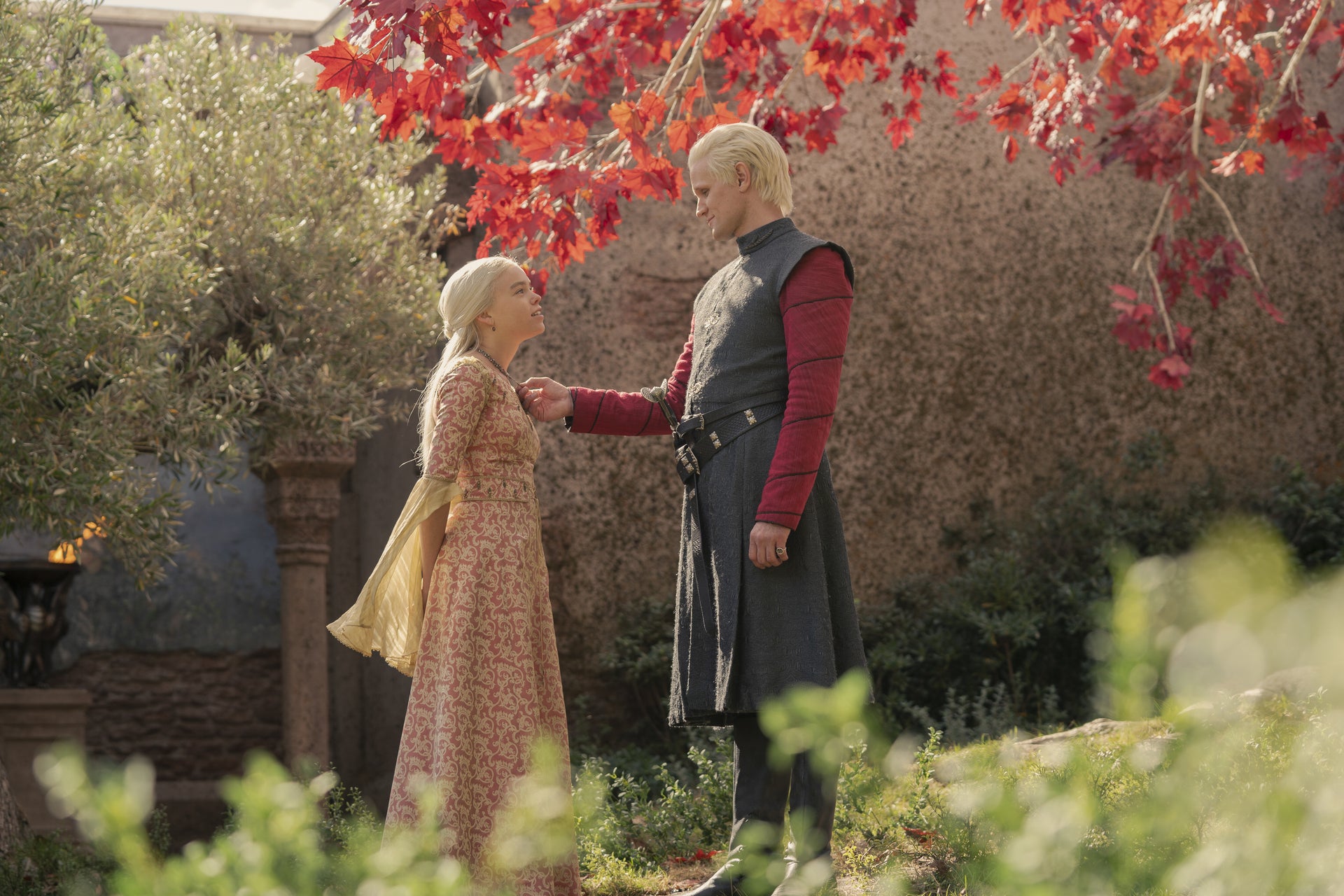
It’s rough. Not just because incest is taboo, but because Rhaenyra is supposed to be about 18 years old and Daemon is presumably somewhere around Matt Smith’s age of 39 (besides, Alcock looks younger than 17 in the show, although the actor is 22). What makes it even rougher is that it’s hot. There is an intense sexual chemistry between Alcock and Smith in the scene that makes their make-out session hard to look away from even as it’s hard to watch. Plus there’s the fact that we know from Game of Thrones that the Targaryen family has no taboo against incest, and that incest was not uncommon in medieval Europe and far beyond, well into the 19th century, particularly between uncles and nieces.
I don’t feel confident enough to truly navigate the sexual and power politics here, at least having just seen it, and determining how much agency Rhaenyra truly has in the scene. Personally, I don’t believe they have penetrative sex because if they did, I don’t think Daemon would stop himself and walk away in furious frustration, despite Rhaenyra’s many attempts to get him to resume. But I also don’t think Rhaenyra would be so sexually frustrated that she’d lure her knight Ser Christon Cole (Fabien Frankel) into her bedroom and seduce him immediately upon returning to the Keep, where they make love (in stark contrast to her make-out session with her uncle). It’s fully possible I’m being naïve, however.
What I do feel confident about saying is how fantastic Emily Carey is as Alicent in this episode, because House of the Dragon continually intersperses Rhaenyra’s journey through King’s Landing with Alicent’s life as queen, which is miserable despite the fact she’s living in the lap of luxury. As Rhaenyra freely explores what the city has to offer, Alicent is trapped taking care of her baby and her constantly drunk husband, whose many open sores need tending in the bath. When a maidservant comes to her room in the middle of the night to tell the queen the king requests her presence, it’s obvious what’s next. Interspersed between shots of Rhaenyra and Daemon’s hot-and-heavy snogging are brief shots of Viserys, back covered in sores, rutting away on a dead-eyed, unmoving Alicent.
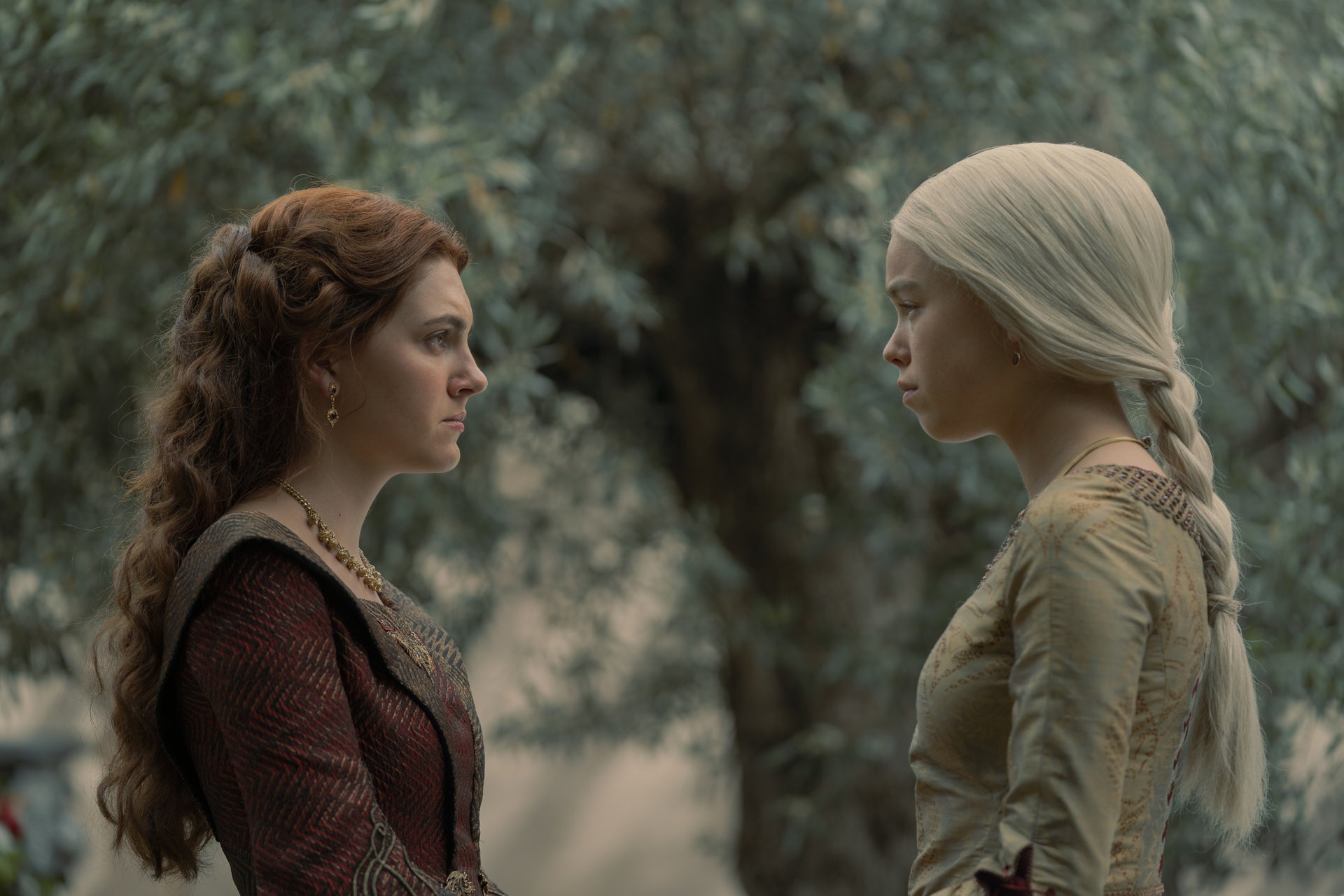
It’s an incredible juxtaposition. Both scenes are gross in completely different ways. Viserys is basically a good man and Daemon is very much not, but if you take out the incestual taboo — which the Targaryens have done — Viserys looks more like a monster here. But while Rhaenyra wants her uncle Daemon at that moment, and Alicent reluctantly choses to go to the king’s bedroom, I don’t know if either woman has any agency here. Alicent certainly not; she’s imprisoned in a cell of what the world tells her is her duty as a wife and a queen, and she’s killed herself inside in order to endure it. She’s the one who chooses to deal with Viserys in the bath and she acquiesces to the king’s midnight summons, but it’s her sense of duty that forces her to do so, not any real desire to serve her old, drunk, farting husband. And whether Alicent’s joylessly holding her crying son or suffering the king’s desires, Carey manages the feat of being completely dead-eyed while somehow exuding the misery and desperation that hides inside Alicent, and how utterly trapped she feels.
But because she was “serving” the king, Alicent is there the next morning when her father Otto Hightower (Rhys Ifans) reluctantly brings Viserys the horrible, horrible news that Rhaenyra and Daemon were seen cavorting in a brothel, and it was confirmed that the princess somehow exited the castle unnoticed and returned through the front gate. Viserys scoffs at the idea of Rhaenyra doing such a thing, but Otto says his spies are trustworthy. Then the king accuses his Hand of trying to disgrace his daughter so that Aegon, Otto’s grandchild, will sit on the Iron Throne, and angrily sends him away. But it’s clear that somewhere, deep inside, he suspects it’s true.
Later, when a thoroughly hungover Daemon staggers back into the castle, the king’s guards roughly grab him and throw him on the stone floor of the throne room, where Viserys is waiting. He’s finally fed up with his brother… almost. Even when Daemon admits it’s true (and I know this discredits my theory more, but I firmly believe that Daemon would say they had sex rather than admit he went through with it out of pride and to hurt his brother, much like he needlessly caused trouble by claiming he was going to have a child), he has the gall to tell his brother that he should wed Rhaenyra to him — “Better me than some whore.” Viserys still can’t bring himself to kill the brother who sullied his daughter. Instead, he’s exiled permanently from King’s Landing and sent back to the wife he hates in the Eyrie, where he will live to surely make more trouble down the line.
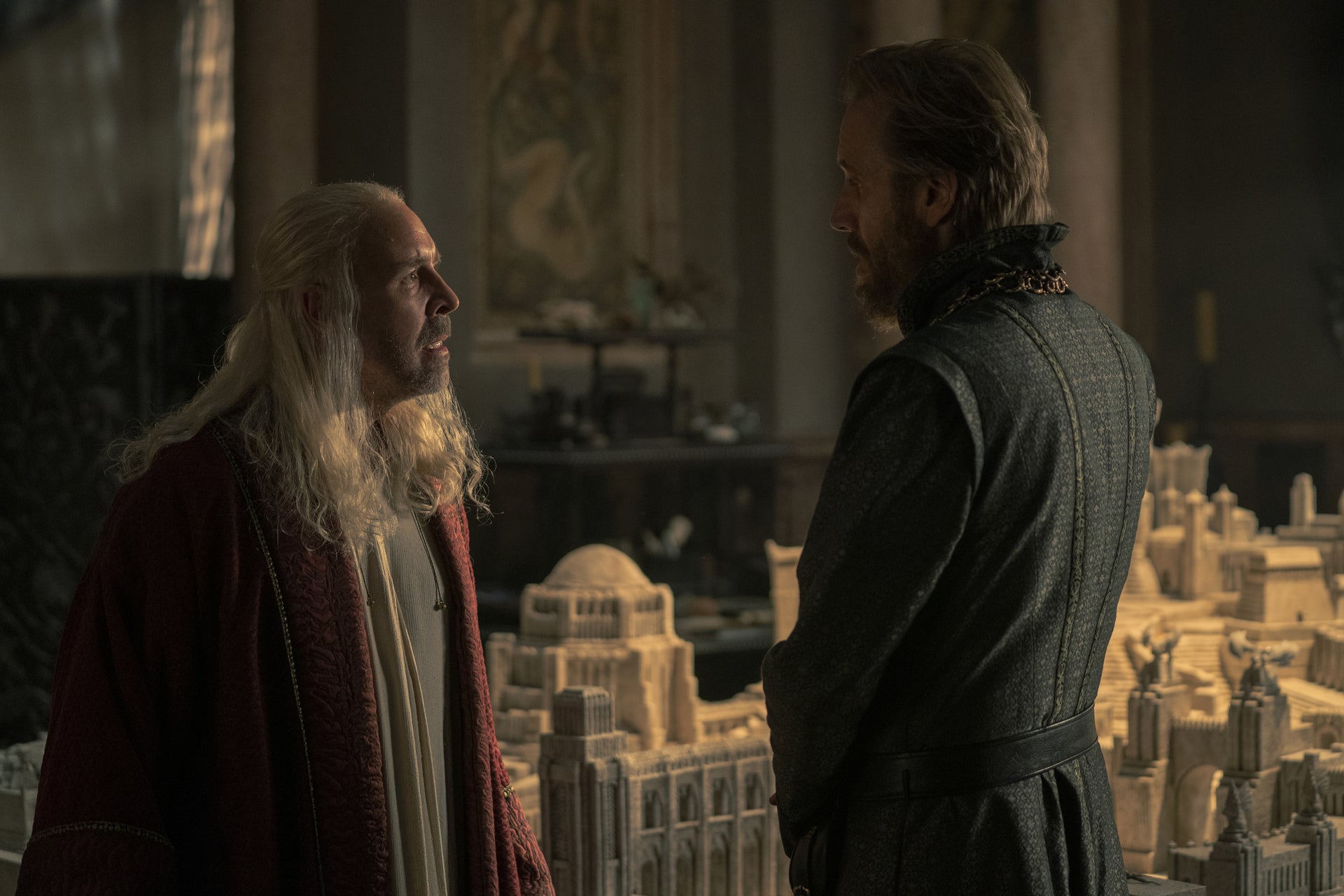
Meanwhile, Alicent goes to confront her friend, who lies to the queen’s face and says Daemon never touched her. Later, when Viserys summons her, she lies again, but Viserys says, correctly, the truth doesn’t matter, the perception does. When a sullen Rhaenyra points out that if she were a man, she could have sex with anyone she pleased and sire a dozen bastards, Viserys says, “You’re right!” in the tone of “No duh!” It’s a double standard and it’s not fair and it’s so ingrained into the entirety of the culture that even the smallfolk don’t think she should sit on the Iron Throne. Viserys can name her his heir, but he can’t make people believe a woman is capable of ruling Westeros. Only she can do that, but if people think Rhaenyra has been “sullied” before she’s been married, she’ll never get the chance.
So in consequence, he says she will marry Laenor, son of Corlys Velaryon and Viserys’ cousin Rhaenys (making Laenor and Rhaenyra second cousins, for the record) to appease the still-angry Sea Snake, joining the two Valyrian houses together, and adding the Velaryon fleets to the Targaryans’ dragons and strengthening their rule. Rhaenyra, knowing that she messed up and her fate is sealed, says she’ll do her duty, but that Viserys must do his: she says Otto Hightower must be removed as Hand of the King because he’s determined to see his grandson on the Iron Throne. His advice cannot be trusted.
Let’s talk about Otto Hightower for a moment. He knew exactly what he was doing when he sent his daughter to console the king after the death of Queen Aemma. But when Viserys decided to remarry, Otto told him the smart choice was to marry Corlys’ (upsettingly young) daughter Laena. Otto has to steel himself before he tells Viserys the heartbreaking news about Rhaenyra, knowing how much it will hurt him. If his only goal was to get Aegon named as heir, he’d have marched in without a thought. If he didn’t want to hurt Viserys, he could have ignored his spies. But Hightower felt a duty to his king, despite knowing that doing so could have consequences for himself — and eventually it does, because late in the episode, Viserys removes him as the Hand of the King, saying he can no longer trust Otto’s judgment.
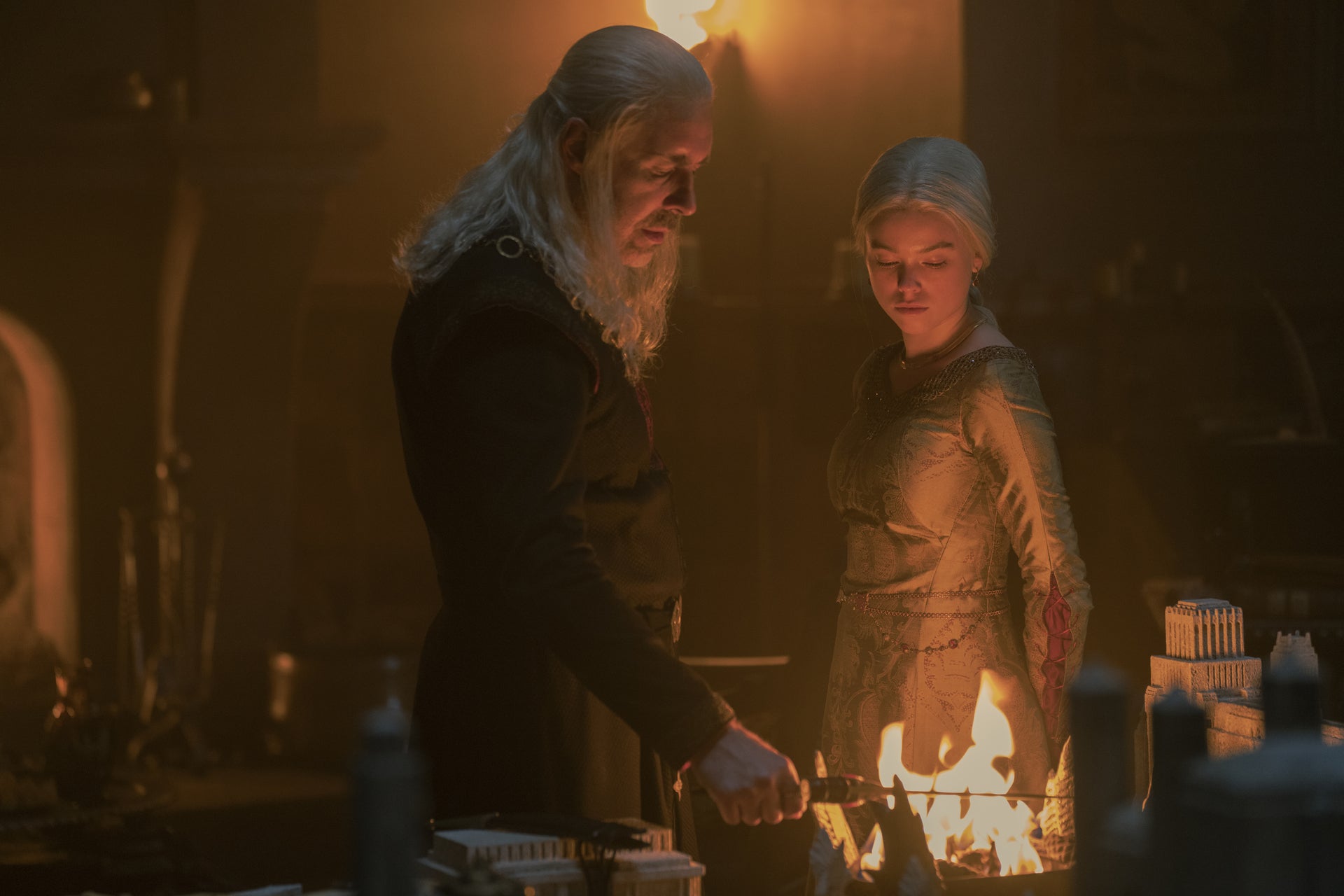
There’s one final scene in “King of the Narrow Sea,” and it’s quietly devastating. Rhaenyra hears a knock on her door, and in walks Grand Maester Mellos with a small pot of tea, sent by the king. “It will rid you of any unwanted… consequences,” he tells the princess, and then departs. And it slowly dawns on Rhaenyra that she’s been sent a medieval version of a morning-after pill.
It’s awful, and it’s supposed to be awful, but it is complicated by the knowledge that Rhaenyra, who’s been so vocal about not wanting to have kids, would almost have certainly sought this out if she’d known it was available and she had access to it. But because it was sent to her by her father, not out of compassion but to make sure nothing would throw a wrench in his plans to marry her to Laenor Velaryon, he’s effectively ordering her to have an abortion. Although the show finished filming well before news leaked that the Supreme Court was going to overturn Roe v. Wade, it is impossible not to draw a comparison to real-world politics, and a woman’s lack of the right to choose and make decisions about her body. Even if Rhaenyra wanted to ensure she was not pregnant, the choice was made for her.
I expect this to be a controversial episode, with some people condemning House of the Dragon for the incestuous and murkily age-inappropriate sex scene, some for Viserys’ tacit/overt rape of Alicent, and then the tea. Many will condemn the series for all three, comparing it to how awful Game of Thrones treated its female characters. I’m by no means certain I’m correct about this, because my perception is male and I can never fully understand the subject here, no matter how much I learn. But it seems to me that Thrones stopped commenting on the inequality and lack of agency women had in the historically inspired setting and began reveling in it, using scenes like Sansa’s rape only to shock audiences. It feels like House of the Dragon is truly saying something about the awful treatment women have been (and are) subjected to, as it shows how it permeates every aspect of their lives — and how even when they’re royalty they have little to no autonomy.
Here’s normally where I’d wrap up the recap with a couple of pithy comments, but I’m not going to do that. I would much prefer to know what you all think about the show, tonight’s episode, and anything I’m forgetting or missing or am ignorant of, assuming you’re interested in that. There’s a lot to talk about, but I’ve done my talking. Now it’s time for me to listen.
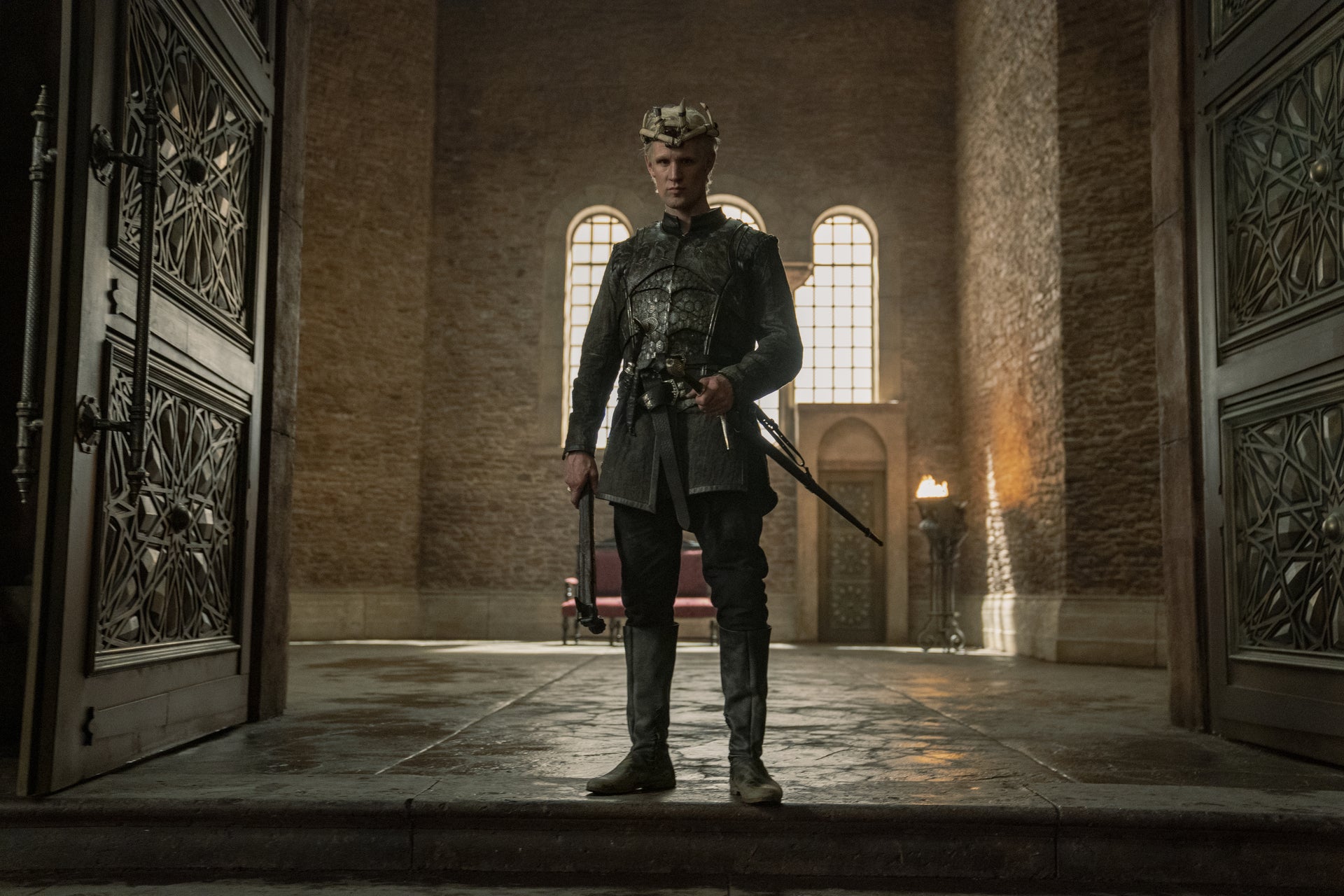
Assorted Musings:
- I feel I should point out that “King of the Narrow Sea” was directed by a woman, Clare Kilner, who’s also doing next week’s episode and the series’ penultimate episode, which made me feel much better about the three sex scenes. If it had been a male director, I think we might have gotten shots of Viserys reluctantly having sex with Alicent out of his sense of duty to produce more potential heirs, or feeling guilt to mitigate the deed, but instead, Kilner forces solely on Alicent’s awful experience without softening it in the slightest.
- During their final conversation, Viserys shows Rhaenyra the first Aegon’s dagger, which was inscribed with words only visible after the Valyrian steel blade was heated with flames. It says, “From my blood comes the Prince That Was Promised, and his will be the Song of Ice and Fire.” The Prince, of course, is one of Jon Snow’s titles, and the song — besides being the name of George R.R. Martin’s book series — refers to the events chronicled in the Game of Thrones TV series, if you happened to forget. I find this a much less clumsy way to connect House of the Dragon to its predecessor than Viserys’ dream speech in the premiere, and if that was the first mention of it I would have lost my shit as opposed to being very irritated.
- It should be lost on no one that Rhaenyra is forced into a political marriage to appease the Sea Snake precisely because Viserys chose affection over his duty and didn’t marry a Velaryon when should have. Regardless of Daemon or her secret tryst with Criston, she is paying the price for her father’s selfishness.
- Again, I may be deluded about what base Rhaenyra and Daemon got to, but I also don’t know how close Otto’s spies could get to tell the difference between extremely heavy petting and the NC-17 version, so to speak. But if I’m wrong, it doesn’t make that much of a difference in terms of the story, it just means I’m a dumb-dumb, and we all already knew that.
- I already miss Daemon’s long hair. Turns out Targaryens look very odd without it.
- If you will indulge me, can I take a moment to tell you how unbelievably fucked my Google search history is because of this episode? Here are things I had to look up, verbatim, in rapid succession: 1) “Age of consent laws by state” 2) “When did royals stop inbreeding” 3) “Uncles who marry nieces” 4) “Morning-after pill.” If someone takes me away, there’s no court in the world that wouldn’t convict me of something. If someone else writes next week’s recap, you’ll know why.
Want more Gizmodo news? Check out when to expect the latest Marvel and Star Wars releases, what’s next for the DC Universe on film and TV, and everything you need to know about House of the Dragon and Lord of the Rings: The Rings of Power.
Editor’s Note: Release dates within this article are based in the U.S., but will be updated with local Australian dates as soon as we know more.
